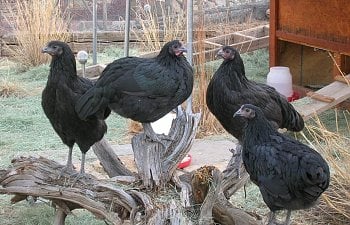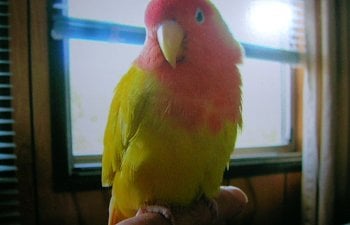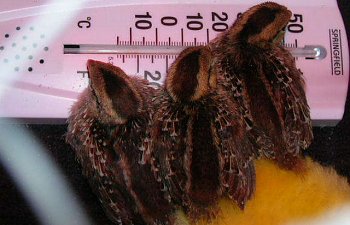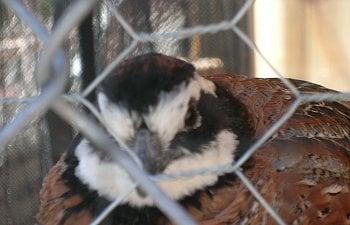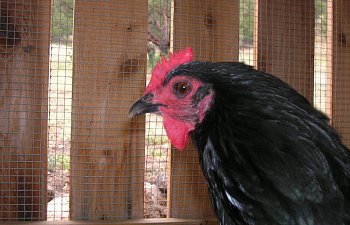Do Poultry Mourn?
It has long been known that Elephants do indeed mourn their fallen comrades as do Giraffes and Apes. But do poultry and others in the avian species mourn? It has been very easy for human kind to think that animals or birds don’t have the capacity to think so deeply as to mourn and possibly are responding to the fear of being eaten themselves or maybe they don’t even recognize the loss at all. But I beg to differ here. I think maybe it is time to add birds to this list of creatures that mourn for the loss of a flock mate.
Lovebirds in the Parrot family mate for life and are called Lovebirds because they are so inseparable. It is a known fact that when the mate of a Lovebird dies, the one left behind does not go looking for a mate, but chooses to pine away and die.
Ravens, Crows and Jays, all members of the Corvid family are known to rival Apes with their intelligence, some using tools to extricate bugs from logs, dropping nuts onto busy streets to break them open, can count and even problem solve.
Researchers from the University of California did studies on Scrub Jays, placing dead bodies of these Jays in these birds territory. When the body was discovered, the Jays formed large congregations around the dead body, using alarm calls and other Jay calls to their fallen flock mate. These calls brought in more Jays to the scene which joined in on the calling. They were then observed abstaining from eating for the rest of that day, possibly in continuation of the mourning process.
Crows can be seen doing the same thing, gathering in large flocks around the deceased flock member, walking in circles around the body for hours on end.
Ravens, mate for life. There is a pair of wild Ravens that live in my territory that I feed. Many years ago the male lost his mate during the breeding season. And while the young were out of the nest, they were still unable to feed themselves and relied on the parent birds to feed them. When this male lost his mate, he brought these very young, fresh out of the nest birds to my front yard and refused to feed them. He sat on the electric post as he usually does and did not eat himself either. I of course, put out food for these young Ravens and after several days they managed to learn how to feed themselves. I never saw the male eat for a very long time. Each day he would bring his young to the yard and disappear for hours on end. He never did return to his duties of feeding these young birds. (Young Ravens are fed by both parents for several months after hatch.) 2 months later he turned up with another mate.
Quail
My first Quail hatch produced 3 baby Bobwhite Quail, 2 males and 1 female. These birds became inseparable throughout their lives. As each took on a mate as Bobwhites do, these 3 never forgot each other, never showed aggression towards one another as other Bobwhites do and remained the best of buddies, breaking the Bobwhite mold of becoming aggressive as they age. Even with the addition of many more birds, these three never broke apart. I have always kept my Bobwhites in large aviaries with lots of brush piles and as close to a natural habitat as I possibly can. Each night, winter, summer, fall or spring, these 3 would call to each other about 30 mins after dark. Locator calls to one another. No matter if each was in the opposite corner snuggled up with their mates, every night they made sure to call and locate each other. They each had their own voice which I could recognize. They called to each other for approximately 1 to 2 minutes. I never heard any of my other Quail locate any of the other birds in the flocks.
One night something must have come prowling and scared the entire flock. When I came out in the morning to start their day, birds were all over the place, perched up high in strange places, on branches, hiding in corners and I could tell something had happened. And there she was. This female from my first hatch laying dead on the floor. She had apparently flushed up into the 6+ foot ceiling and broke her neck. Of course I was not only stunned but heart broken. The two remaining males searched for her for weeks, looking into every crevice, every corner, behind every bucket, inside their enclosure. The males stopped mating with their mates. They called all day long and even into the night. Each night when these 3 should have been calling to each other, only the males called and for her. Their calls were no longer 1 to 2 minutes long but instead went on and on for an hour or more, only to start back up at midnight. They called for her for 2 months.
Another incident within my Quail aviaries:
Last year one of the males lost his mate to old age. I did my best to keep her alive, but to no avail she passed on. I had been nursing her in their coop attached to the aviary and he knew she was in there as I would occasionally let him in there to see her. However she did pass away. This male was in sheer panic mode. One odd thing was that he refused to go into their coop for a couple of months afterwards and I think he was sure I had something to do with it. I made the mistake of showing her deceased body to him and I don’t think the bird ever forgave me for that! He knew she was gone so there was no need to search for her. So he hid in the corner deep within the brush pile and refused to come out. A normally very active, hyper, loud rooster was reduced to hiding and sorrow. He stopped being vocal and was silent. He stopped eating. He stopped everything. He would hide so well I sometimes couldn't find him. He was not hiding out of fear, but rather depression. He didn't care anymore. This male had sat down to die. This behavior went on for 6 weeks. I had to work to get him to eat every day feeding him some of his favorite foods just to keep him alive. About 6 or 7 weeks later he emerged from the dark corners of the brush piles and began frantically calling for a mate, day and night.
Chickens
How about your Chicken Flock? Years ago I raised my first flock of Black Australorps. There were 2 in the group that were absolutely inseparable, “Tillie” and “Miss Molly”. They did everything together! Ranged together, slept together, ate together, preened together. When one laid and egg, the other seemed to have to lay too. These two were always talking! I am not sure if they were talking to each other but there was never silence during the day with these two in the coop or run! One time Tillie had to be taken to the vet for a case of bumblefoot that I just could not get healed on her. (I later found out the flock had MS, but that is another article altogether!) Miss Molly watched me carry Tillie down the path to the car. She stood at that gate all day, pacing, screaming and not eating. When I brought Tillie home later that day, Miss Molly was there at that gate, anxious for me to put Tillie down. Of course Tillie had to lay an egg and ran as fast as she could back to the coop and into one of the boxes. Miss Molly stood at the bottom of the ramp waiting for Tillie to finish laying. It was only then Miss Molly went back to eating.
Last summer Miss Molly turned up with the beginnings of heart failure. Miss Molly couldn't keep up with Tillie any more, but Tillie always made sure to check up on her best buddy, they still came together to snack, sleep and preen. Miss Molly declined and eventually she passed away. Tillie was a basket case. She started by looking everywhere! She would stand in the run and call and call and call. Even the flock leader went looking for Miss Molly. Each morning she would hop down off the roost bar and look into each nest box. At night, in the dark, she would go searching in the run, looking into every corner for her.
After a few days of Miss Molly not returning, Tillie started to understand that Miss Molly was not coming back. When she finally was sure Molly was gone for good, Tillie became depressed. She went completely silent. Not a sound was uttered from her. She sat on the roost bar and refused to preen. She stopped eating and she stopped laying. At the two week mark Tillie refused to even go out to free range. If I took her outside with the others, she would stand there and stare blankly into space. The stress of losing her best friend threw Tillie into a heavy molt.
One evening as the birds ate their evening seed snack before roosting, Tillie skipped her snack and stood in the dark run by herself as the others ate. She stood along the edge of the run, staring out into the darkness and let out this very quiet, very high, very long whine. She stood motionless and just let out this long mournful whine without even taking a breath.
I picked her up and placed her on the roost bar as the others jumped up into their usual spots. When I turned out the light, Tillie panicked. She flapped and kept falling off the roost bar. I turned on the light and got her back up. Each and every time I turned out the light she repeated this panic. After about an hour and her possibly becoming too tired to panic any more, she stopped and went to sleep. That next day I put a radio in the coop (along with the ticking clock that has always been in there) set to some quiet music. I didn't force her to go out with the others to free range and didn't pressure her to get off the roost bar anymore. 6 weeks later she began to utter a few sounds, but only when goodies are being served. She still has yet to go back to her endless talking and is not buddying up to any of the others in the flock.
*Update: At the 8 week mark, Tillie returned to laying and she seemed to have returned to her old self. She talks up a storm continuously now and is back her old tricks of trying to sneak out the coop door for some free range time as the others look on in jealousy. Has she forgotten her old pal? Somehow I doubt that. The bond between these two was just too close.
Closing Statements
Are these stories going to be common occurrences in every flock? Maybe. Not every bird is attached to another or at least enough to miss them when they are gone. Not every flock has pairs of birds that are so close however many do. They do however recognize every bird in their flock and cannot be fooled when adding new birds. Was Tillie really mourning over the loss of Miss Molly? Were the two male Quail really calling for their sister? Was the male Quail that lost his mate really depressed enough to give up on life?? I can’t be 100% sure that this was actually their way of mourning. However something was definitely going on with these birds and they indeed did understand that one of their flock mates was gone for good and it didn’t sit well with the one left behind. Maybe they aren’t “bird brained” after all.
A big "Thank You" to the following members who contributed these next stories on mourning in their flocks:
"Sourland" writes:
Several years ago I was judging a field trial in Rhode Island. At the exit that I took from I 95 to go to the club a Canada goose had been hit. For four days the mate was either sitting or standing by the side of the dead goose. The morning of the fifth day the mate was no longer there. Mourning?
"Goneinc" writes:
Years ago I had a pair of Muscovy ducks. My husband ran over one when he left for work and did not even notice. I heard the duck making a great deal of noise. It was the male hovering over the body of his mate. He would not leave his dead mate all day. I finally could not take it any more and removed the dead female.
At the time I had a few broody hens who had just hatched out some chicks. I think there were about ten chicks a week or so old.
After I removed the female duck the male went in to the chicken coop and killed all the chicks. He had been very docile before that and the ducks and chickens had lived together peacefully. I gave him away after that.
"pennyshubby2906" writes:
We had a pair of Lavender Orpingtons. A roo and hen. About 2 months ago our roo was killed by a predator. We thought we had lost our hen as well, but we were able to find her and she was healthy. She had been faithfully laying an egg a day up till that point. After we lost the roo, she stopped laying for a month and a half. She just started laying again. Her attitude didn't really change other than becoming a little more withdrawn, but about the time she started laying again, she came back around stronger, I think she has separation anxiety as well. If we are outside she is right beside us and sticks as close as she can.
"Chickenrpoetry" writes:
I lost my Easter Egger, Marigold, to a raccoon. Her sister (more like mother in her eyes,) Henrietta wailed for around two weeks. After that she refused to eat- it broke my heart to watch her mourn.
Her sister Dreamcatcher tried to soothe her by giving her bugs (which was strange because Dreamcatcher never shares,)
Fortunately, Hen got over her grief a little while ago. But sometimes she stops and stares at the place where Marigold used to sit in the coop.
Just thought I'd share- people generally don't believe that poultry mourn.
"Suzie" writes:
When Maman died last February...Papa ( her Husband ) would go to her coop every day and call for her...it was heartrending..he died some two months after the demise of Maman...
One of my Ganders died and his mate has not come to terms with her loss...she still ventures to the river where I found his body...
YES..without doubt they do mourn loss...
Thanks for this post Layla...it is very thought provoking and may help people in the future to understand more about their charges...
"socialdougal" writes:
We had a pair of free-range, laying Isa Browns who could always be seen scratching around all over the place together.
Then one of them was killed by a feral cat. The evidence was feathers, some of them bloodied, laying in the garden, and plenty of paw prints in the wet earth. The surviving hen was standing alone at the back of the house.
Later that day, I saw the survivor picking up the feathers of the dead hen in the garden. Then she started to call out like she was calling the other hen. If I did not see and hear it myself, I would never have believed it. At the risk of sounding like a soft old git, that's one of the most surprisingly sad events I've personally witnessed.
She is still giving eggs, but now spends most of her time sitting around. Her behaviour is markedly different.
I already abstain from most animal products. If I did not, this would have inspired me to get started. As it happens, I now feel more motivated to abstain completely.
As for our solo hen, she'll get some new company as soon as I make them a safe area to scratch around in.
*Please feel free to contribute a story to this article in the comments below!*
More info on mourning in your flock can be found here:
https://www.backyardchickens.com/th...th-of-their-coop-mates.1536287/#post-25914669

